COMMENT Very many things about the fourth part of the Bersih progression will be long remembered. But perhaps the first that comes to mind will always be its sheer size, duration and atmosphere.
No previous rally, not even the enormous Bersih 3, attracted as many participants. The earlier rallies were half-day affairs that concluded by mid- or late-afternoon, either as planned or forced by police assault. This one went on for 36 hours, overnight from Aug 29 to 30, only ending before midnight’s transition to National Day 2015. And whereas tension hovered over the past three rallies, a carnivalesque spirit was everywhere felt in Bersih 4.
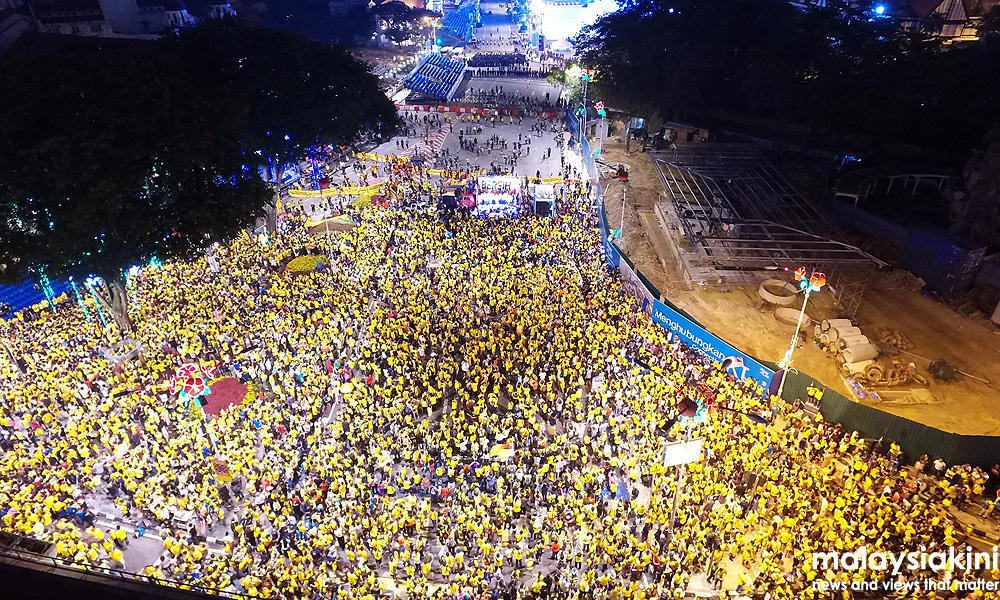 Even so, it may be more important to reflect on three unexpected things that defined Bersih 4 more distinctly.
Even so, it may be more important to reflect on three unexpected things that defined Bersih 4 more distinctly.
First, Chinese participants formed a clear majority at the rally. Second, Dr Mahathir Mohamad appeared at Bersih 4 on both days. Third, the usual slate of demands for reform was overshadowed by an urging for Prime Minister Najib Abdul Razak’s resignation. Individually these were remarkable developments. Collectively they had a profound political importance.
Enter the Chinese
In the 13th general election, BN lost more parliamentary seats, even more state assembly seats, and the popular vote to Pakatan Rakyat compared to the previous general election. Responding to that dismal result, Najib could do no better than lay blame on a “Chinese tsunami”.
Many opposition figures and civil society activists reacted by criticising Najib for putting a racial gloss on Umno-BN’s haemorrhaging support. They were not wrong. Yet, one would be protesting too much to deny that anti-regime sentiment among the Chinese had swelled to tsunami proportions in 2013.
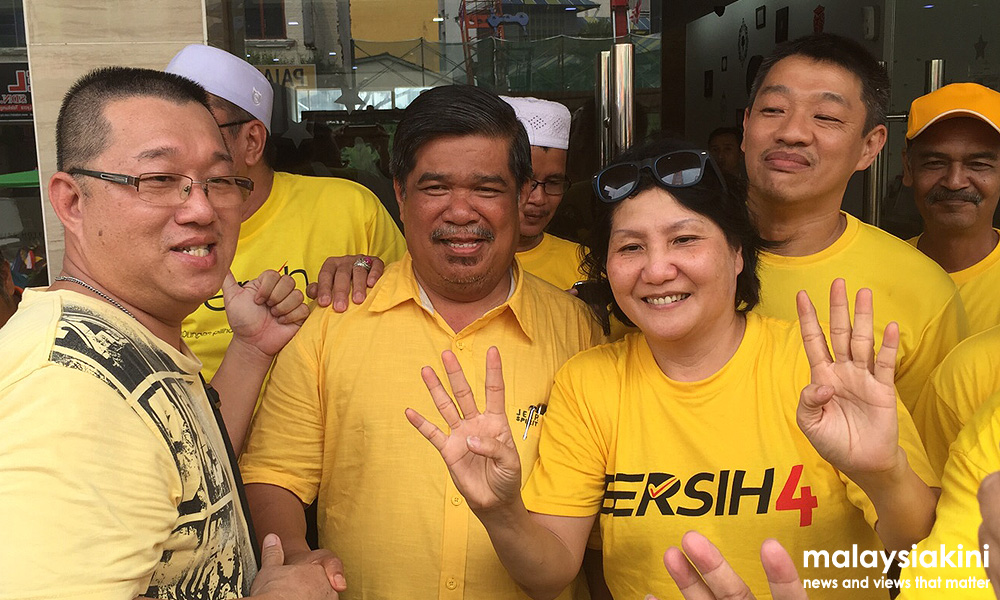 Chinese voters, including diasporic voters who returned to native shores at their own expense, swept into GE13 with one goal in mind: ABU, Asalkan Bukan Umno. Anyone but Umno. The Chinese electoral revolt bore DAP to its unsurpassed triumph in 2013 and might have staunched the losses that PKR and PAS suffered because of a Malay swing to Umno.
Chinese voters, including diasporic voters who returned to native shores at their own expense, swept into GE13 with one goal in mind: ABU, Asalkan Bukan Umno. Anyone but Umno. The Chinese electoral revolt bore DAP to its unsurpassed triumph in 2013 and might have staunched the losses that PKR and PAS suffered because of a Malay swing to Umno.
An uncomprehending Umno-owned Utusan Malaysia cried out in despair, ‘Apa lagi Cina mahu?’ What else do the Chinese want?
They answered this in Bersih 4: Undur Najib! Resign, Najib!
From 2006 onwards, Umno and the regime had variously antagonised the Chinese. The party had scapegoated the Chinese during their annual general assemblies. The regime tolerated ethnic and religious provocations, refused to reform the electoral system, and so on.
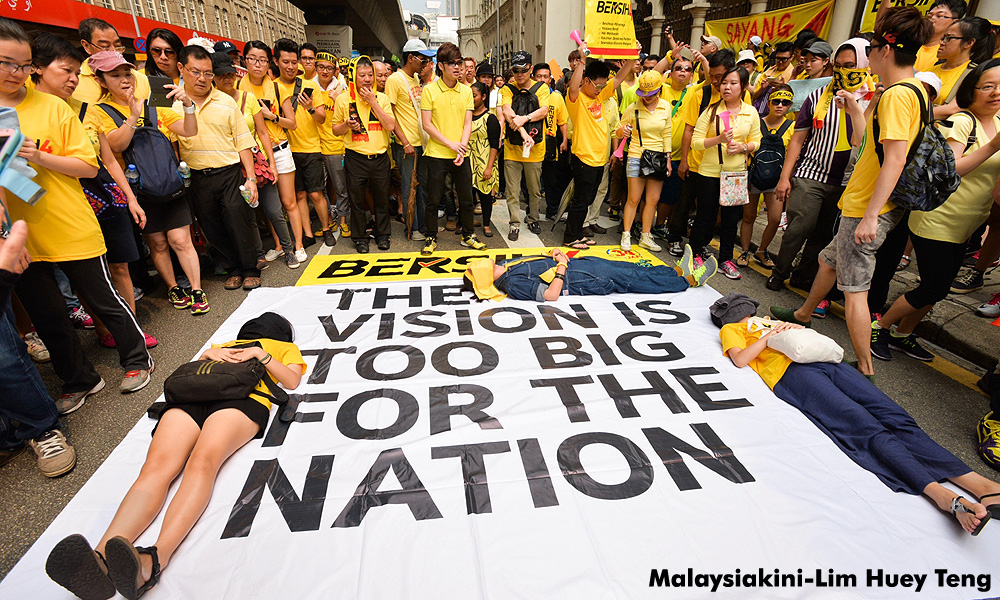 If the Chinese-majority participants in Bersih 4 opposed Najib and Umno-BN, then, it was not over old issues of ‘Chinese politics’ - language, education, schools and even the New Economic Policy (NEP). These issues had been largely resolved some years before Mahathir left office.
If the Chinese-majority participants in Bersih 4 opposed Najib and Umno-BN, then, it was not over old issues of ‘Chinese politics’ - language, education, schools and even the New Economic Policy (NEP). These issues had been largely resolved some years before Mahathir left office.
Even those matters paled before the financial scandals that grew ever more frequent, ever larger and ever more brazen. Indeed, if they could, Bersih 4 would have wanted the heads of all those responsible for turning 1MDB into a national disgrace, and those who aborted a proper investigation of it.
Like previous financial scandals and ‘high profile corruption’, 1MDB aroused the deep indignation of the Chinese. But they were not offended as Chinese per se. They were angered as only financially savvy, urban middle-class segments of society could be angered over money, public money.
They had a long and proud tradition of ‘handling money’ and paid most of the taxes. So, who else but they would mount the largest protest when exposés emerged of ‘disappeared’ money, in unimaginably large sums, without transparency or accountability?
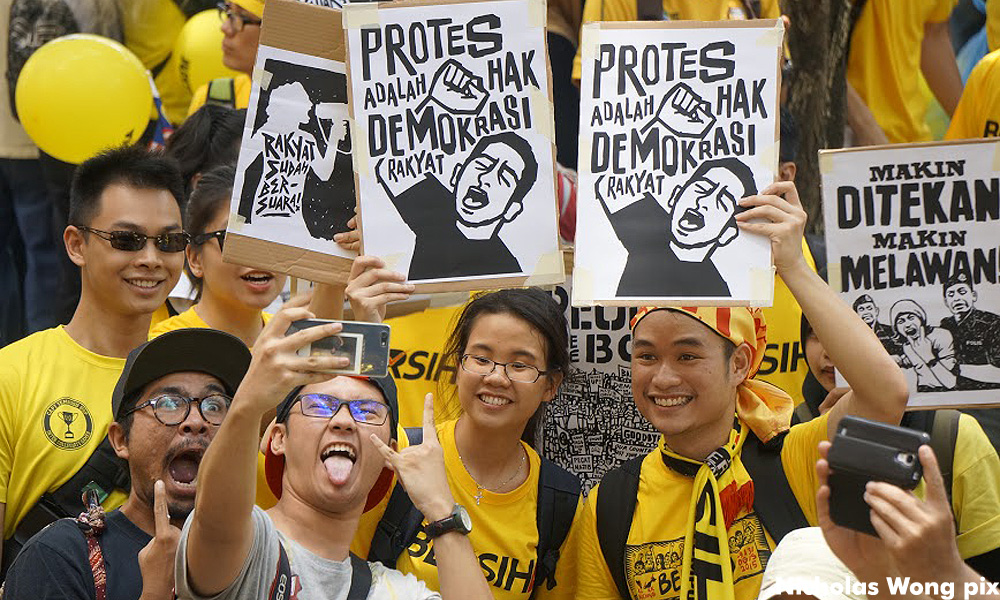 When the Bersih 2.0 committee included the urging for Najib’s resignation among its demands for Bersih 4, who but proudly self-made and autonomous citizens would put their money where their mouths were - by supporting Bersih 4 and donating 10 times the amount that the committee appealed for and more quickly than scheduled?
When the Bersih 2.0 committee included the urging for Najib’s resignation among its demands for Bersih 4, who but proudly self-made and autonomous citizens would put their money where their mouths were - by supporting Bersih 4 and donating 10 times the amount that the committee appealed for and more quickly than scheduled?
The Chinese made an astonishing turnaround to form the majority in Bersih 4. They were ethnically the last to join the open demonstrations of recent memory. The Malays began Reformasi and kicked off Bersih in 2007. The Indians backed Hindraf in 2007. The Chinese were absent from Reformasi, hardly visible in Bersih 2007, showed up noticeably for Bersih 2.0, and joined Bersih 3 in force.
No one labelled the first three Malay-majority Bersih rallies as ethnic affairs. Did a Chinese majority make Bersih 4 a ‘Chinese demonstration’ against a ‘Malay government’, which was how Umno, its media, cyber-troopers and red-shirts tried to paint it?
Not at all. It partially made Bersih 4 ‘the Reformasi of the Chinese’. They retrieved the anti-corruption and anti-cronyism discourse of the original Reformasi with a vengeance because they were less hampered than other ethnic communities.
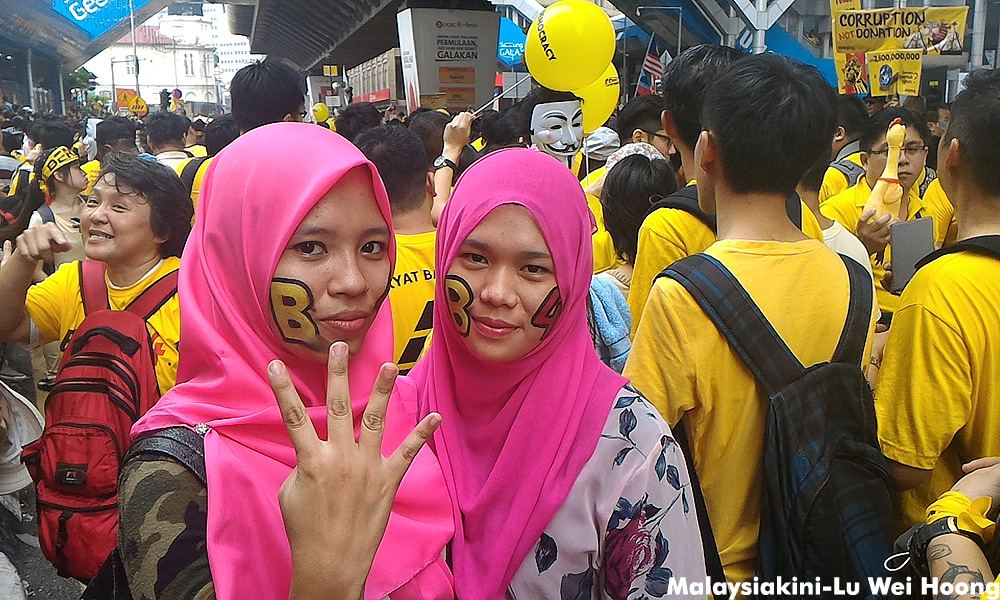 Many Malays remained closely bound to the regime. Most non-Malay bumiputera had been left adrift. Working-class Indians were tied to poor wages and conditions. Unlike them, the urban middle-class Chinese were more financially and socially independent. They had exit strategies of swift capital outflows, recourse to private education around the world, and wider possibilities of emigration.
Many Malays remained closely bound to the regime. Most non-Malay bumiputera had been left adrift. Working-class Indians were tied to poor wages and conditions. Unlike them, the urban middle-class Chinese were more financially and socially independent. They had exit strategies of swift capital outflows, recourse to private education around the world, and wider possibilities of emigration.
By standing their ground in Bersih 4, the urban middle-class Chinese atoned, as it were, for not supporting Anwar Ibrahim at the moment of his fall. If Chinese voters had been half as angry in 1999 as they were in 2013, Mahathir, Umno and BN might have been swept from power in the 10th general election.
An old man reinvents himself
Instead, Mahathir appeared at Bersih 4 to rub shoulders with the protesters!
Before Bersih 4, rumours were rife that Mahathir would join the rally. If he went, pro-Umno and pro-Najib quarters warned, he would play into the hands of the Chinese, the DAP and anti-Malay forces.
Mahathir being Mahathir, went to Bersih 4 twice. On the first day, he went to see the rally for himself and let himself be seen. On the second, he openly showed his camaraderie with the protesters, thereby undermining the anti-Chinese tone of the anti-Bersih narrative.
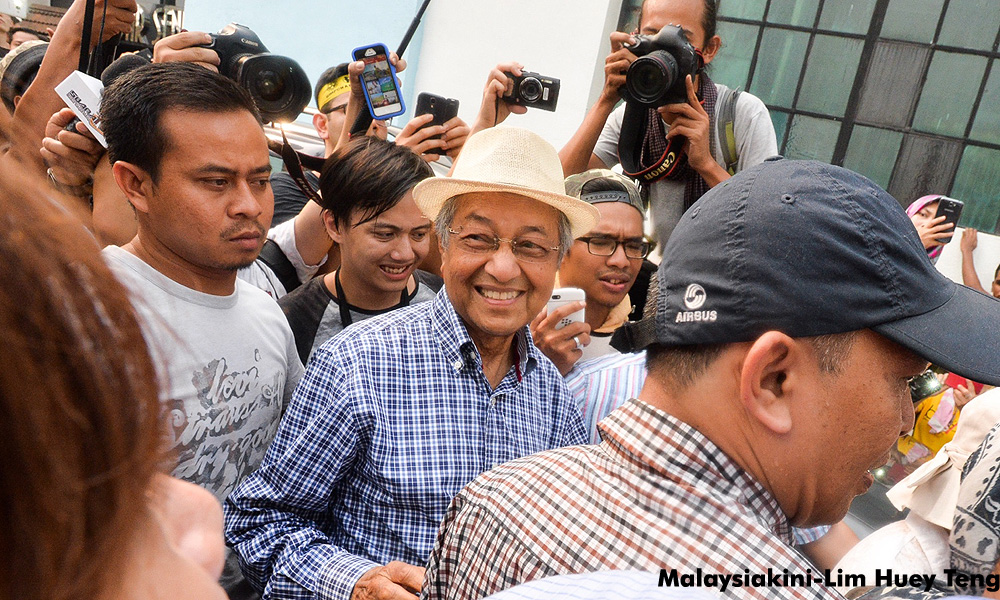 Consternation rose among some people, though. Even dissidents sickened by the scandals of the Najib regime would not forget or forgive Mahathir for his scandals. How could the rot in Najib’s time not be part of ‘Mahathir’s legacy’? Should a mean old man who once lived in a big glass house be throwing stones?
Consternation rose among some people, though. Even dissidents sickened by the scandals of the Najib regime would not forget or forgive Mahathir for his scandals. How could the rot in Najib’s time not be part of ‘Mahathir’s legacy’? Should a mean old man who once lived in a big glass house be throwing stones?
‘Apa sebenarnya Mahathir mahu?’ What did Mahathir really want? Evidently he wanted the same thing that the protesters did: Undur Najib! And after that?
Some suspected that Mahathir only wanted to replace Najib with another Umno leader to allow Umno time and space to regain popular support for the next general election. That way Mahathir and his old cronies would be safe from a new opposition regime.
If this was Mahathir’s agenda, the Bersih committee wanted no part of it. He was not offered a platform when he attended the rally. At a makeshift press conference, he said that he was with Bersih 4 because Najib had intimidated, bought over, or silenced those who had investigated him or called for his resignation.
What a paradox 17 years had created! How enticing it was to witness an old man reinventing himself as a dissident in his twilight years.
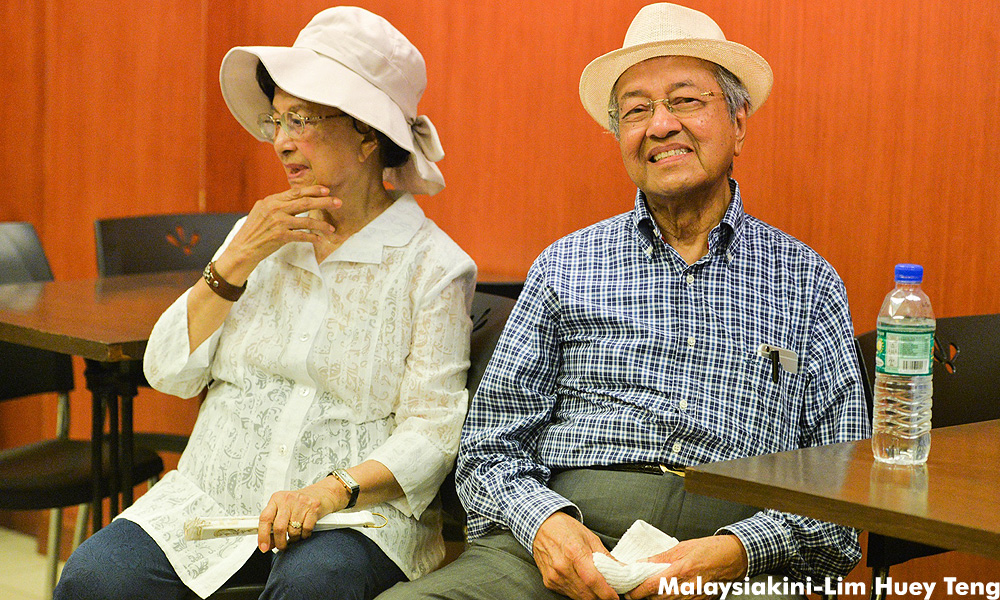 Had he done so out of remorse over the past? Maybe: out of office, he might have realised and regretted that he had allowed so much rot to fester in his administration. Was he driven to despair at the present? Perhaps: because he had helped to topple Abdullah Ahmad Badawi to pave the way for Najib but soon he needed to replace Umno itself. Had he genuine concern for the future? Probably: for more than half a century since his Che Det days he had worried over the future of country and society.
Had he done so out of remorse over the past? Maybe: out of office, he might have realised and regretted that he had allowed so much rot to fester in his administration. Was he driven to despair at the present? Perhaps: because he had helped to topple Abdullah Ahmad Badawi to pave the way for Najib but soon he needed to replace Umno itself. Had he genuine concern for the future? Probably: for more than half a century since his Che Det days he had worried over the future of country and society.
For all we know, it could be all three but speculation on this score will go on inconclusively for a long time while people marvel or fume at his opportunism.
Tortured stalemate
This much, though, we can learn from the coming together of the ‘Chinese Reformasi’ and Mahathir’s reinvention via Bersih 4. It was a product of the tortured politics of the post-1998 period. It was also evidence of a virtual stalemate between the regime and the opposition, since neither has been able to defeat the other decisively.
Some observers believe that Umno’s post-March 2008 strategy has been successful. It has recovered Malay support with a chauvinistic turn, crippled Pakatan’s leadership by removing Anwar Ibrahim, and split the ties between DAP and PAS.
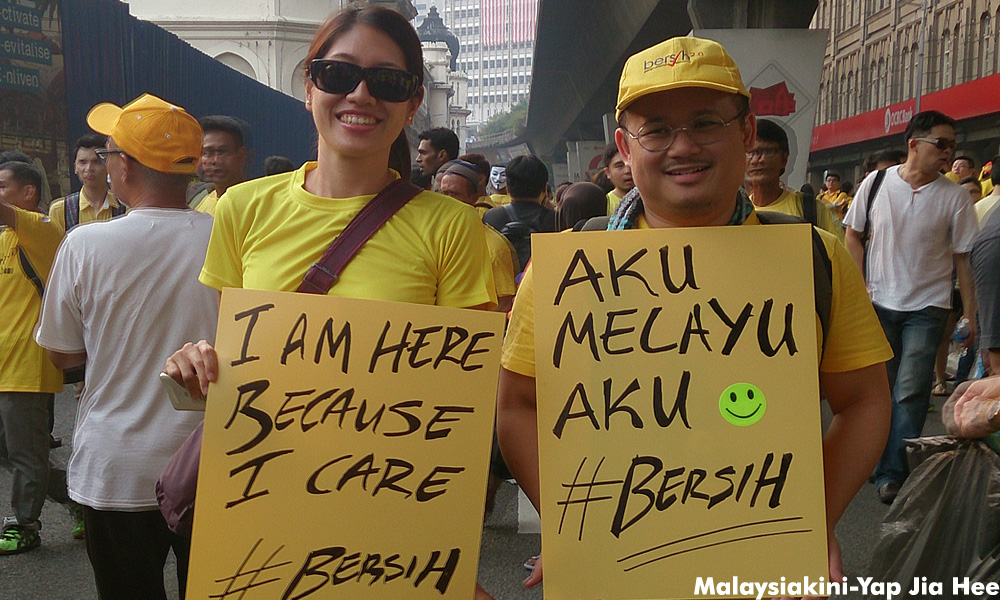 Even so, Bersih 4 exposed a political impasse rather than any step forward for Najib and Umno. Najib’s apparent strength was derived from executive power and institutional repression. The reality, though, was of an Umno that had gone backwards.
Even so, Bersih 4 exposed a political impasse rather than any step forward for Najib and Umno. Najib’s apparent strength was derived from executive power and institutional repression. The reality, though, was of an Umno that had gone backwards.
Najib’s dreaded ‘Chinese tsunami’ swelled in response to Umno’s alienation of the non-Malays that predated Bersih. Far from abating, it peaked in Bersih 4.
As it turned out, Mahathir’s political re-entry was the prelude to a four-way dispute over the Malay base to which Najib and his Umno coterie so desperately cling. In current ‘Malay politics’, however, not obedience but recalcitrance and not unity but splits are the order of the day. No one yet knows how the Umno-PAS-Amanah-Bersatu tangles will end.
With the Malay base in contention, and the capital lost, Najib and Umno could yet face a restive Sabah and Sarawak. Attempts to spread Bersih 4 to these two states were blocked. Minimally, though, these regions may not remain safe for the regime when the political centre flounders in such flux itself.
Finally, a large portion of the backdrop to Bersih 4 was supplied by external exposés, beyond censorship and repression. To those, Najib’s regime could reply with nothing but laughable spins that have virtually destroyed its legitimacy internationally.
On the eve of Bersih 5, therefore, the entire Bersih progression has caused the regime to be steadily besieged in almost every possible way, beginning from the street to the stadium to the square… and the world.
Part 1: The Bersih rally that helped bring 2008 tsunami
Part 2: Bersih 2.0 - resurrection at Stadium Merdeka
Part 3: Bersih 3 - the attempt to reclaim Kuala Lumpur
KHOO BOO TEIK is the author of ‘Beyond Mahathir: Malaysian Politics and its Discontents’ and, as reminded by P Ramakrishnan, a member of Aliran.

